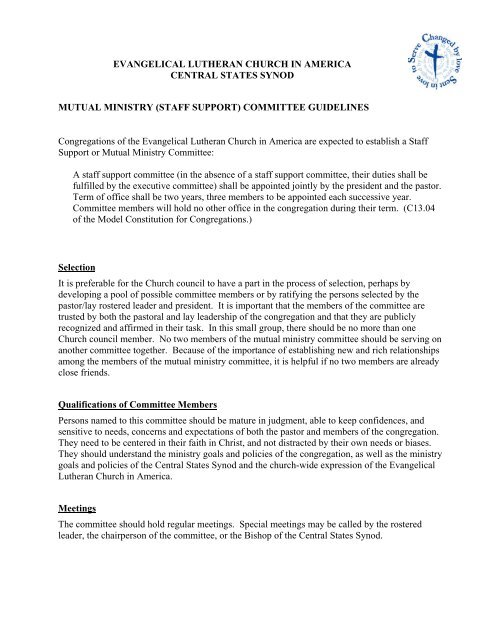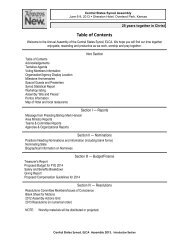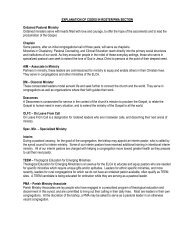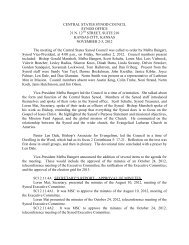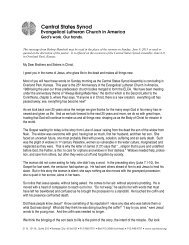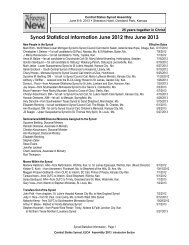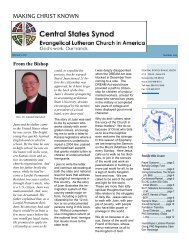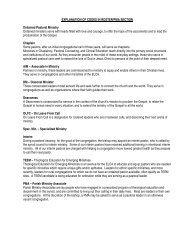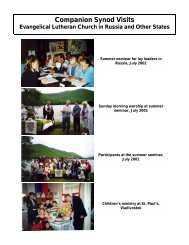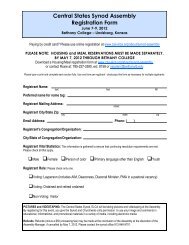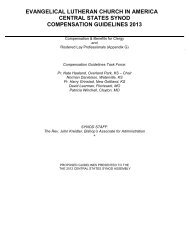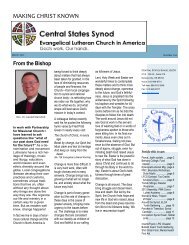Mutual Ministry Guidelines - Central States Synod
Mutual Ministry Guidelines - Central States Synod
Mutual Ministry Guidelines - Central States Synod
You also want an ePaper? Increase the reach of your titles
YUMPU automatically turns print PDFs into web optimized ePapers that Google loves.
EVANGELICAL LUTHERAN CHURCH IN AMERICA<br />
CENTRAL STATES SYNOD<br />
MUTUAL MINISTRY (STAFF SUPPORT) COMMITTEE GUIDELINES<br />
Congregations of the Evangelical Lutheran Church in America are expected to establish a Staff<br />
Support or <strong>Mutual</strong> <strong>Ministry</strong> Committee:<br />
A staff support committee (in the absence of a staff support committee, their duties shall be<br />
fulfilled by the executive committee) shall be appointed jointly by the president and the pastor.<br />
Term of office shall be two years, three members to be appointed each successive year.<br />
Committee members will hold no other office in the congregation during their term. (C13.04<br />
of the Model Constitution for Congregations.)<br />
Selection<br />
It is preferable for the Church council to have a part in the process of selection, perhaps by<br />
developing a pool of possible committee members or by ratifying the persons selected by the<br />
pastor/lay rostered leader and president. It is important that the members of the committee are<br />
trusted by both the pastoral and lay leadership of the congregation and that they are publicly<br />
recognized and affirmed in their task. In this small group, there should be no more than one<br />
Church council member. No two members of the mutual ministry committee should be serving on<br />
another committee together. Because of the importance of establishing new and rich relationships<br />
among the members of the mutual ministry committee, it is helpful if no two members are already<br />
close friends.<br />
Qualifications of Committee Members<br />
Persons named to this committee should be mature in judgment, able to keep confidences, and<br />
sensitive to needs, concerns and expectations of both the pastor and members of the congregation.<br />
They need to be centered in their faith in Christ, and not distracted by their own needs or biases.<br />
They should understand the ministry goals and policies of the congregation, as well as the ministry<br />
goals and policies of the <strong>Central</strong> <strong>States</strong> <strong>Synod</strong> and the church-wide expression of the Evangelical<br />
Lutheran Church in America.<br />
Meetings<br />
The committee should hold regular meetings. Special meetings may be called by the rostered<br />
leader, the chairperson of the committee, or the Bishop of the <strong>Central</strong> <strong>States</strong> <strong>Synod</strong>.
Functions of the Committee<br />
MUTUAL MINISTRY: This committee is a “people-building” group charged with making sure<br />
that the ministry goals of the congregation are carried out mutually by the pastoral leadership and<br />
the members. The committee observes and listens to the rostered leader and other congregational<br />
members to make sure that no one is under-functioning, nor over-functioning, in accomplishing<br />
the agreed upon goals for the congregation.<br />
SOUNDING BOARD: The rostered leader should be able to look to this committee as a place<br />
where he or she can try out new ideas regarding ministry goals and receive honest feedback.<br />
PASTORAL SUPPORT: Since the committee is concerned with pastoral effectiveness and the<br />
work of the congregation, it needs to support the leader in asking for adequate working conditions,<br />
fair and just compensation, and time away from the congregation for family life and personal<br />
renewal. This committee has no decision-making authority, but it may be an advocate for the<br />
leader before the Church Council, Finance Committee, Personnel Committee or other appropriate<br />
congregational forum.<br />
PARTNERS IN PLANNING FOR CONTINUING EDUCATION: All rostered leaders are<br />
expected to participate in 50 contact hours of continuing education each year. The leader, in<br />
partnership with the committee, is to develop a continuing education plan that benefits the personal<br />
growth and needs of the leader in the context of the ministry goals of the congregation.<br />
Accountability<br />
In terms of confidentiality, committee members are accountable to the leader and to one another.<br />
Information shared in meetings is not to be talked about outside the group unless permission is<br />
given by the one who shared it.<br />
The Committee forwards any recommendations regarding the ministry of the congregation and/or<br />
the ministry of the rostered leader to the Church Council or appropriate committee for action and<br />
implementation. It has no authority to set policy or program. Any formal review of the leader’s<br />
and congregation’s ministry and performance is the responsibility of the Church Council.<br />
No committee minutes will be kept. A general report will be made annually to the Church Council<br />
stating the number of meetings held and describing the leader’s continuing education program.<br />
Additional information will be included only with the consent of the leader.<br />
In order to help the mutual ministry committee work effectively and understand their<br />
common purpose, we strongly encourage the members of the committee to read together<br />
Pastor and People: Making <strong>Mutual</strong> <strong>Ministry</strong> Work, copyright 2003, Augsburg Fortress<br />
Publishing.


